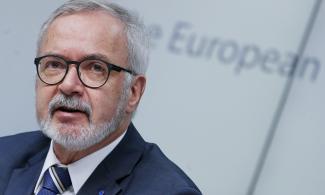
“The bank’s recent commitment to make available between 800m and 1bn euros for public sector investment, demonstrates the growing EU-Nigeria ties and EU confidence in the Nigerian economy,” she revealed. Mrs Ahmed estimated the value of funds spent by the trade bloc in the country to be €1.6 billion

The European Union through its investment arm- the European Investment Bank (EIB), is to invest €800-1 billion into Nigeria’s public sector. This was disclosed by Zaynab Ahmed, the country’s Minister of State for Budget and National Planning, during an EIB event to highlight its efforts inNigeria.
“The bank’s recent commitment to make available between 800m and 1bn euros for public sector investment, demonstrates the growing EU-Nigeria ties and EU confidence in the Nigerian economy,” she revealed. Mrs Ahmed estimated the value of funds spent by the trade bloc in the country to be €1.6 billion:
“Over the past 20 years, EIB had facilitated numerous public private sector driven projects totalling about 1.60 billion euros in Nigeria in the areas of agriculture, power, transportation and Small and Medium Scale Enterprises (SMEs).”
EIB’s Head of Regional Representation for West Africa, Isabella Van Grunderbeeck, said it would be investing €87 million and €650 million in 65 companies through direct and indirect investment this year. She said the company had pumped in direct funds worth €297 million since 2010 into; “Wholesale & retail trade, education, manufacturing, construction, transportation, accommodation, human health, information & communication, electricity & gas, agriculture, scientific & technical activities,” Grunderbeeck detailed. The EU ambassador to Nigeria, Katil Karlsen, said the drive to invest in Nigeria was its own response to migration and mobility issues in Africa.
The European Union has been fractured over how to deal with illegal migrants. Anti immigration stalwarts are winning seats in Italy, Austria, Netherlands, etc and German Chancellor Angela Merkel’s stance on acceptance of migrants is under threat from her own coalition.